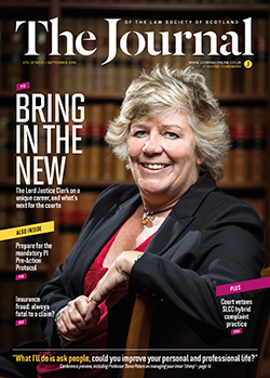Law reform roundup
The Society’s committees have been working on a number of Scottish and UK Parliament Bills and consultations. Key areas are highlighted below. For more information see www.lawscot.org.uk/law-reform.
Reforming the Legal Services Market
The Society responded to the Competition & Markets Authority's Interim Report on the Legal Services Market. It believes that the legal services sector should be fully transparent from a competition and consumer protection perspective, and that providing clear information for consumers is essential to ensure they are making informed choices.
While this particular study focuses on legal services in England & Wales, many of the themes relate to Scotland and consumers across the UK should have easy access to all the information necessary to make a fully informed and reasoned choice in selecting a legal services provider.
The Society further maintains that those providing any legal advice or services are regulated to some degree. Consumers purchasing legal services from the unregulated sector, without even being necessarily aware of that, are exposed if something goes wrong.
It also criticised current legislation which prevents anyone from acting as a notary in England & Wales unless they were admitted there.
The Society is currently in discussions with the Scottish Government in relation to regulating legal services In Scotland.
Occupational pension schemes
The Pensions Law Committee responded to a UK Government consultation on plans to cap early exit charges in occupational pension schemes that contain flexible benefits. The pensions freedoms introduced in April 2015 gave people with defined contribution pensions more options and flexibility about how they fund their retirement. Early exit charges can deter people from exercising these freedoms.
The committee generally agrees with the Government’s approach, but warns that there may be some confusion on what constitutes an exit charge, specifically in an occupational pension scheme.
Policing and Crime Bill
The Criminal Law Committee responded to the Scottish Parliament Justice Committee’s call for evidence in considering its approach to the legislative consent motion on the Policing and Crime Bill. It is generally supportive of the measures where the consent of the Scottish Parliament is required. These include police maritime powers, cross-border powers of arrest, restoration of littering powers, and firearms.
With reference to cross-border powers of arrest, the committee noted that currently there are no powers available in urgent investigations where an individual is alleged to have committed a serious offence in one UK jurisdiction, where no arrest warrant has been issued and the suspect has turned up unexpectedly in another. Clause 105 will provide for this in respect of specified offences to be prescribed. The Society supports this.
Non-compete clauses
The Employment Law Committee has responded to the Department for Business, Innovation & Skills’ call for evidence on non-compete clauses.
Non-compete clauses are used in a very wide range of sectors and situations. Properly drafted, such restrictions will protect the interests of the employer without unfairly restricting the employee’s ability to compete. The present system, where clauses are routinely included in contracts but do not routinely require to be enforced by the courts, appears to be working satisfactorily. If court action does result, application of the legal principles should result in restrictions being imposed only in appropriate circumstances and for appropriate periods, to protect the legitimate interests of the business where these would have an adverse effect on the employee concerned. The Society believes that restricting the use of non-compete clauses could have severe adverse effects on businesses and the legal protection they receive.
The Policy Team can be contacted on any of these matters at policy@lawscot.org.ukTwitter: @lawscot
In this issue
- Beyond the named person service
- Sexual harassment: an everyday problem
- Governing Scotland in a federal United Kingdom
- Losing our judgment? (1)
- Reading for pleasure
- Opinion: Alison Reid
- Book reviews
- Profile
- President's column
- The future, step by step
- People on the move
- Changing face of the courts
- Success: the chimp factor
- Courts reform: a call to pre-action
- Teeth that could be sharper
- Good claims, bad lies
- Unlocking doors: demystifying squatting
- Back to basics
- Brexit and IP: what should solicitors be doing now?
- Agency, insolvency and termination
- Brexit and the agricultural sector
- A carnival for some, but not for others
- Scottish Solicitors' Discipline Tribunal
- Culling of the hybrids
- Common property: what policy?
- Cause of action
- Client balances: reminder issued
- Law reform roundup
- From the Brussels office
- Paralegal pointers
- Your Law Society of Scotland Council Members
- At the doors of the court
- Ask Ash
- To the focused, the medals
- Losing our judgment?
- MacKenzie boosts Society's AML drive






